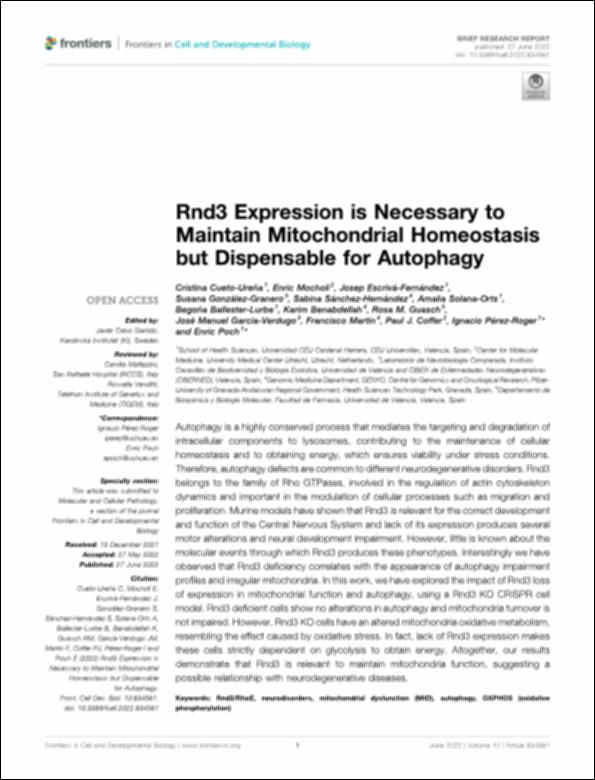Please use this identifier to cite or link to this item:
http://hdl.handle.net/10637/13916Rnd3 expression is necessary to maintain mitochondrial homeostasis but dispensable for autophagy
| Title: | Rnd3 expression is necessary to maintain mitochondrial homeostasis but dispensable for autophagy |
| Authors : | Cueto Ureña, Cristina Mocholí Gimeno, Enric Escrivá Fernández, Josep González Granero, Susana Sánchez Hernández, Sabina Solana Orts, Amalia Ballester Lurbe, Begoña Pérez Roger, Ignacio Poch Jiménez, Enric |
| Keywords: | Proteína RhoE.; Bioquímica.; Sistema nervioso central - Aspectos bioquímicos.; Central nervous system - Biochemical aspects.; Proteína RhoE.; System nervous - Degeneration.; Sistema nervioso - Degeneración.; Homeostasis.; Biochemistry. |
| Publisher: | Frontiers Media |
| Citation: | Cueto-Ureña, C., Mocholí, E., Escrivá-Fernández, J., González-Granero, S., Sánchez-Hernández, S., Solana-Orts, A., Ballester-Lurbe, B., Benabdellah, K., Guasch, R. M., García-Verdugo, J. M., Martín, F., Coffer, P. J., Pérez-Roger, I. & Poch, E. (2022). Rnd3 expression is necessary to maintain mitochondrial homeostasis but dispensable for autophagy. Frontiers in Cell and Developmental Biology, vol. 10, art. 834561 (27 jun.). DOI: https://doi.org/10.3389/fcell.2022.834561 |
| Abstract: | Autophagy is a highly conserved process that mediates the targeting and degradation of intracellular components to lysosomes, contributing to the maintenance of cellular homeostasis and to obtaining energy, which ensures viability under stress conditions. Therefore, autophagy defects are common to different neurodegenerative disorders. Rnd3 belongs to the family of Rho GTPases, involved in the regulation of actin cytoskeleton dynamics and important in the modulation of cellular processes such as migration and proliferation. Murine models have shown that Rnd3 is relevant for the correct development and function of the Central Nervous System and lack of its expression produces several motor alterations and neural development impairment. However, little is known about the molecular events through which Rnd3 produces these phenotypes. Interestingly we have observed that Rnd3 deficiency correlates with the appearance of autophagy impairment profiles and irregular mitochondria. In this work, we have explored the impact of Rnd3 loss of expression in mitochondrial function and autophagy, using a Rnd3 KO CRISPR cell model. Rnd3 deficient cells show no alterations in autophagy and mitochondria turnover is not impaired. However, Rnd3 KO cells have an altered mitochondria oxidative metabolism, resembling the effect caused by oxidative stress. In fact, lack of Rnd3 expression makes these cells strictly dependent on glycolysis to obtain energy. Altogether, our results demonstrate that Rnd3 is relevant to maintain mitochondria function, suggesting a possible relationship with neurodegenerative diseases. |
| Description: | Este artículo se encuentra disponible en la siguiente URL: https://www.frontiersin.org/articles/10.3389/fcell.2022.834561/full En este artículo de investigación también participan: Karim Benabdellah, Rosa M. Guasch, José Manuel García-Verdugo, Francisco Martín y Paul J. Coffer. |
| URI: | http://hdl.handle.net/10637/13916 |
| Rights : | http://creativecommons.org/licenses/by/4.0/deed.es |
| ISSN: | 2296-634X (Electrónico) |
| Issue Date: | 27-Jun-2022 |
| Center : | Universidad Cardenal Herrera-CEU |
| Appears in Collections: | Dpto. Ciencias Biomédicas |
Items in DSpace are protected by copyright, with all rights reserved, unless otherwise indicated.


